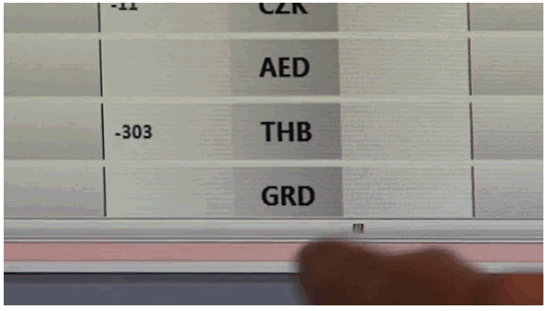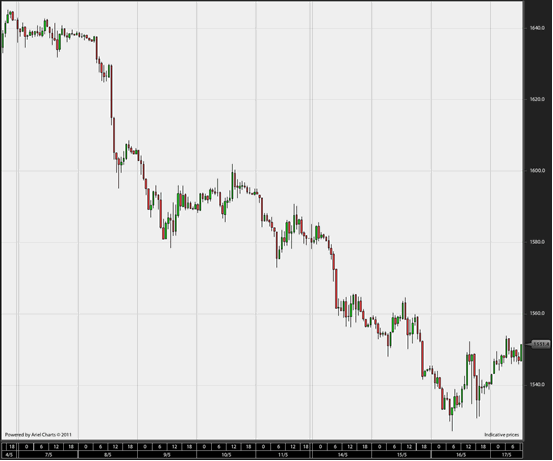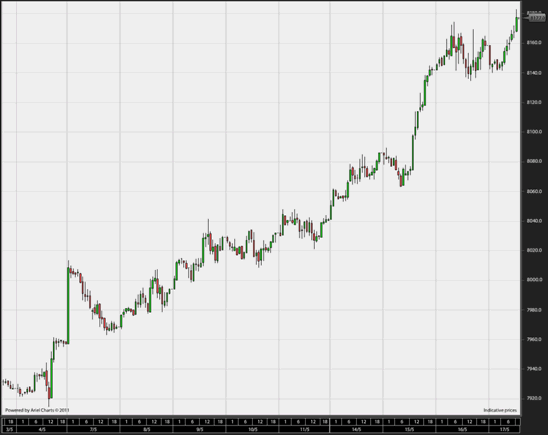 A great time for a Greek default
A great time for a Greek default
It’s easy to lose track of how far we’ve come in the past year.
We’re so desensitized to news about the Euro crisis.
There are a handful of news stories over the past week, that – individually – could have caused a market tumble a few months ago.
But now, we just shrug our shoulders when the British PM talks about a Eurozone “break up” … at news that the UK is back in recession … or that Spanish borrowing costs leaped to 5% … and that Greek voters have rejected austerity … And even Angela Merkel, who’s stance has been resolute throughout, is talking about a Eurozone no longer made up of 17 members …
Hell, now we’ve even got a new word for it: Grexit!
Who’s ready for a Grexit?
Up until now, no one could be seen to be planning a Greek exit – it would become a self-fulfilling prophecy. But now the unspeakable is being spoken of more and more openly. Even political leaders don’t seem to be able to deny it anymore. And business leaders are clearly preparing for Grexit.
The Institute of Chartered Accountants for England and Wales have surveyed companies who trade with the Eurozone. 19% of them are actively bringing back cash from the euro area and converting it into pounds and dollars.
And another serious threat is looming in Greece – a run on the banks.
Since Monday, Greeks pulled around 800 million euros out of the nation’s banks. Since 2009, between 25 and 30% of Greek deposits have left the country.
Personally, I’m amazed that it isn’t more. But I suspect that is more down to the fact that most Greeks simply don’t have the kind of spare cash to be planting it offshore.
And check this out …

Yep, “GRD” stands for Greek Drachma. Now up and ready to go on the ETX trading platform.
So, how do you prepare for a Grexit?
Your first thought ahead of all this panic, might be to stock up on gold, traditionally a safe haven in troubled times.
However, if we take a quick look at how gold is reacting to the latest episode of the Euro crisis …

This shows how gold has tumbled over the last two weeks.
So, where is everyone putting their money?
Here’s what the dollar index for the same period looks like …

It’s a story we’ve seen again and again throughout the euro crisis – the euro looks so bad, that other currencies (namely the dollar) look like beacons of strength and stability by comparison.
So the current safe-haven of choice for investors is the dollar.
There are plenty of conspiracy theories around as to why gold has fallen from favour. And one of the big ones is to do with US elections – i.e. that the gold price is being artificially manipulated to keep oil and food costs low in the States. Hence boosting Obama’s re-election chances. If it’s true, we should be cautious of gold until after the election in November.
The steps you can take
Finding a safe-haven is one thing, but the real aim of a short-term investor should be to ensure that they are best placed to profit from a Grexit, rather than to hide their earning potential away from it.
There is no doubt that there will be some serious moves in the markets in the weeks and months ahead. You want to ensure that your money is there, taking advantage of these moves.
* On the positive side, you want to look at all the techniques that will allow your profits to run. If the market is making a big move – you want to get a big slice of that move. Consider using trailing stops to maximize the potential of winning trades.
* On the negative side, if the market is moving against you, you want to ensure that your back is covered.
Of course, I trust that we always trade with a stop loss in place. But, when the markets are moving fast, sometimes we won’t get out at the level we’ve asked for, so we need to be prepared to suffer the downside of this volatility as well.
* If your stops are getting hit more and more often, consider trading with a wider stop. Take a look at how the daily range of your instrument has changed – are you trading with an out-of-date stop level?
* One of the most important things to learn about if you’re going to keep safe in volatile markets is correlations. If you’re not au fait with what currencies, indices and commodities correlate positively and negatively with each other, you could find the stops on all your trades getting hit in one fell swoop.
This isn’t a great situation to be in – it means that your risk levels are much higher than they should be.
For example, if you’re short on gold … long on USD … and short on the S&P … You’ve effectively tripled-up your risk.
If you’re in any doubt about the instruments you’re trading and how they affect each other – don’t trade so many. Cut back on the number of different markets you’re trading until you understand how they relate to each other. Sure, diversity is a good thing, but only when your positions are helping to hedge each other (i.e. when one goes down, the other is likely to go up).
* And finally, don’t panic! Provided you’re practicing good money management, there’s no reason that a Grexit should negatively affect your trading. In fact, it could give it a shot in the arm.
And in the next seven days …
Next week we may see Mervyn King breathe a sigh of relief as inflation finally starts to come down. The figures that’ll be released on Tuesday will have April 2011’s sharp rises in petrol prices drop out of them, so we could see inflation fall to 3 per cent.
However, consumer spending is still set to look depressed in figures on Thursday. The blame will fall on rain … cold … bank holidays … you name it! But the real villain is squeezed incomes and underemployment.
Thursday will also bring us the second estimate of Q1 GDP, which will be a test of whether the last figures that showed the UK going back into recession where accurate.
On Wednesday we’ll find out what the MPC are thinking, when the minutes of this month’s meeting are released. With weak spending and inflation coming down, there may be pushes for more quantitative easing in the face of the economic threat we’re facing from our biggest trading partner, the Eurozone.
US economic data over the last month has been largely positive, which is one of the reasons that the flow of funds into the dollar has been so strong. Their bugbear has been home sales, and figures out on Tuesday and Wednesday will reveal whether there’s any progress on this front.

 A great time for a Greek default
A great time for a Greek default